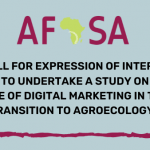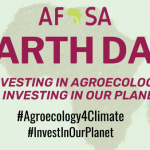Documenting seed case studies to scale up the narrative of Farmer Managed Seed Systems in Africa
Terms of Reference
Introduction: These terms of reference invite agricultural actors and those involved in the seed sector to share the good and little-known stories of traditional seeds, local seeds and farmer seed systems. These stories will be collected in documented case studies by interested authors. We will accompany them in the documentation process. The case studies will be published at the national and international levels. The case studies will be documented in such a way as to provide policymakers with the necessary arguments to better support farmers’ seed systems but also to strengthen the confidence of farmers’ communities in their knowledge, skills and practices in genetic diversity management. It is, therefore, a significant contribution to the agroecological transition.
Context
In Africa, seeds are about culture, tradition, spirituality, cooperation, and solidarity. Seeds are about survival, providing diverse and healthy food to feed families every day, and livelihood. Today’s seed embodies centuries of knowledge about how to conserve, exchange, plant and guide it to fruitful expression. Africa’s rich diversity of food crops is thanks to diverse ecosystems to local farming communities – notably women, the custodians of seeds. Local seeds are reliable, available, and affordable, but the seed corporations want them outlawed. These seeds and the cultural systems and knowledge that underpin them are threatened by policies designed to benefit corporate interests while criminalising and vilifying farmer-managed seed systems (FMSS).
Farmers’ seeds are the basis of agricultural production and diverse, healthy food systems across Africa. They persist – and thrive – despite well-funded programs promoting corporate seed and the industrial food and agriculture regime they are part of, receiving little or no support from public policies and frequently denigrated in the public narrative.
In various regions of our continent, farmers, and their networks, with civil society organisations, have strongly resisted. They have actively advocated against inappropriate seed laws and restrictive Intellectual Property (IP) regimes, which are being pushed onto Africa through the financialisation of genetic and public resources and misguided corporate philanthropy and foreign development agendas, harmonisation strategies and trade agreements. Substantial evidence and argument from African and western nations show why these are inappropriate and fundamentally misplaced, given nations’ commitments around climate change, biodiversity, human rights and their cross-cutting SDGs. These policy arguments are underpinned by the living knowledge and farmers’ everyday practices of exercising their rights and continuing to use, share and sell their diverse seeds and sustain the agroecological food systems of their bioregions.
To continue to resist the strengthening of corporate dependence in Africa, FMSS and the celebration and value of African peasants, smallholder producers, and conservers on Genetic Resources need to be continually and better communicated.
Over the past three years, AFSA has published seed policy research and seed case studies and contributed to connecting FMSS stakeholders to a single and strong movement. AFSA has also drafted a regulatory framework for seed policies conducive to FMSS and got it approved in 12 countries[1] by its member networks, which organised national consultation meetings. Farm Saved Seed Network (FASSNET), a member network, has also developed a framework for seed policy favourable to FMSS in Malawi. Such a framework can be used by FMSS platforms as a concrete proposal to submit to policymakers at different levels.
Seed supply and management on the African continent is categorised under three main groups:
- “informal” (local) seed supply systems – based on farm-saved seed and exchange,
- integrated systems – that are based on community seed supply
- and the formal (corporate) seed supply systems, which are highly regulated and privatised both in production and distribution (Lema, 2013; AFSA, 2017).[2]
Dismissed by policymakers as outdated practices, to be replaced by the so-called ‘formal’ seed system, which promotes so-called ‘improved’ hybrid and GMO seeds supplied by commercial seed companies, today there are signs of recognition of FMSS by policymakers in Africa. For example, the 2021 AUC draft “Continental Guidelines for Harmonizing Seed Regulatory Frameworks in Africa” (AUC/DREA/c/036) dedicates a section to FMSS, while the term “informal seed” was previously used in any official or legal paper.
Still some work needs to be done to scale up FMSS as a real solution for the transition to agroecology and food sovereignty in Africa:
- Many seed stories are not told and may disappear if not documented and kept alive in practice
- Young generations are not aware of all the culture and spirituality surrounding seeds and related food
- Local seeds’ resilience to drought, climate change, floods, and their high yield in well-managed ecosystems are not told
Understanding Farmer Managed Seed Systems is now more than ever important to activists, development partners, organisations, and policymakers in the African agriculture arena. In December 2021, during its annual general meeting, AFSA’s Seed Working Group decided to do more regional seed research and seed case studies to support/inform advocacy for FMSS in 2022. This perspective aligns with CROPS4HD[3], a collaborative project in which AFSA is leading the policy advocacy part; and can better inform the AUC seed harmonisation process.
Objective
These terms of reference are an invitation for you to get involved. Maybe you already have a case study of good practice to send us, or maybe you have access to a great project yet undocumented. Maybe you have reports and photos that can help to show the benefits of Farmer managed seed systems, local seeds, traditional seeds, etc. Or maybe you need help to research and document a success story on those seeds.
We can help you compile and share your seed case study, showing the many benefits in the following areas:
| Areas | It’s about, but not limited to… |
| Gender security | Specific seeds have enabled youth, women and men to better express themselves in the community |
| Poverty reduction and income generation | Because of specific traditional seeds, a person or a community has improved their economy |
| Climate change adaptation | Specific seeds (seed system) used by communities to face climate hazards (drought, flood, etc.) |
| Tolerance/resistance to salinity, acid soil, pest and diseases | Specific traditional seed varieties to fight salinity, to cultivate in saline or Acid soil, to resist/fight pest/diseases |
| Biodiversity conservation |
The role of agrobiodiversity for adaptation to climate change – and which kind of varieties/crops adapt better. Negative impacts of seed policies on FMSS |
| Yielding | Traditional seed varieties with higher yield than corporate seeds |
| Cultural sensitivity | Traditional seed varieties are specially used for special events in a community |
| Quality assurance | An initiative that develops a quality assurance system for traditional seeds |
| Trading | A well-structured and functional distribution system of traditional seeds from FMSS |
| Healthy diet (nutrition) | Specific traditional seeds are used for specific diets to improve people’s nutrition |
|
Accessibility, Availability, Suitability, Stability |
Seeds that meet those criteria |
| Food self-sufficiency | Ensuring food autonomy and independence with farmers’ seeds |
| Etc. |
If you have a case you would like to share, you are warmly invited to get involved.
Please prepare your Expression of Interest by answering the questions below (Annex) in English or French
and send it to: fredj.kaouach@permaculturetunisie.org & famara.diedhiou@afsafrica.org by 2 May 2022.
OR
You can fill the form online here: https://forms.office.com/r/WfP0mnsg3r
DEADLINE IS 2 MAY 2022
Authors of approved[4] expressions of interest will be invited to fully document their case(s) by 10 June. The best case studies will be professionally edited, designed, translated into both English & French, and published online and in hard copy. You can see some recent AFSA case studies on seeds at https://afsafrica.org/case-studies-seed/.
Annex
Expression of Interest Form (no more than 1 page)
- Contact details including a brief presentation of the organization/community
- What is the success (the failure)? (30 words max)
- How does it work? (50 words max)
- Where is it happening or where it happened? (max 25 words)
- Is the case being documented? (max 30 words)
- If Yes, by whom? Where is it published? (max 30 words)
- What is the area concerned: number of villages, impacted people, etc.? (max 50 words)
- How does it benefit local communities? (max 50 words)
- How can we scale up (or mitigate if negative) the case? (30 words max)
- What support do you need to document the case for international publication? (max 25 words)
- What are the lessons and challenges? (max 25 words)
Download a copy of this Terms of Reference here
[1] Burkina Faso, Kenya, Tunisia, Senegal, Eswatini, Lesotho, Namibia, Malawi, Mozambique, South Africa, Zambia and Zimbabwe
[2] Lema, N.M (2013). Scoping Study on Seeds and Agriculture Research Processes in Tanzania “The case of small scale farmers’ participation in setting research agenda” A consultancy report for Eastern & Southern Africa Small Scale Farmers’ Forum (ESAFF). Morogoro, Tanzania
[4] This process has set up an approval committee to assess EOIs and review full case studies before final publication.

































